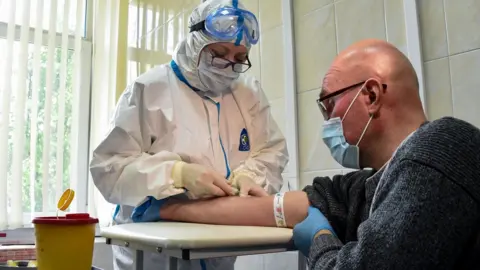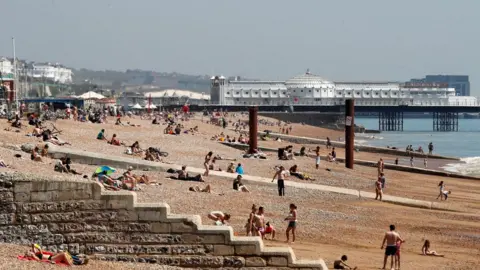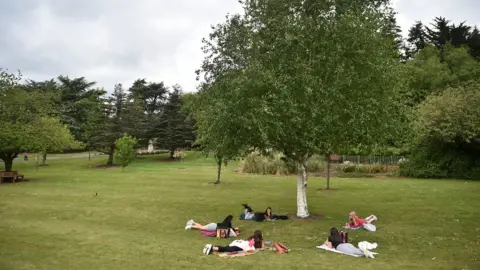Coronavirus: Deal agreed for antibody virus tests on NHS
 Getty Images
Getty ImagesHealth and care staff will be the first to receive antibody tests to check if a person has had coronavirus, after the government agreed a deal with a large pharmaceutical company.
The tests will be available on the NHS for "those who need them", No 10 said.
At the moment, the only testing available are swab tests to check if someone currently has Covid-19.
The UK-wide antibody tests will help scientists with virus research, BBC health correspondent Nick Triggle said.
It comes as the government announced on Thursday a further 338 people had died after testing positive for the virus.
The deal follows talks between the government and Swiss firm Roche.
The prime minister's official spokesman said: "The tests will be free for people who need them, as you would expect. NHS and care workers will be prioritised for the tests."
The Health Secretary Matt Hancock is expected to give more details this evening.
Immunity question
The coronavirus tests already available to all adults and children aged over five on the NHS involve taking a swab up the nose or from the back of the throat. These tests tell you if you currently have Covid-19.
The antibody test is a blood test that looks for antibodies in the blood to see whether a person has had the virus. Antibodies are made by our immune system as it learns to fight an infection.
However, having antibodies does not automatically mean you cannot get sick or harbour the virus and pass it on to others, says BBC health correspondent James Gallagher.
The World Health Organization says there is no evidence people who have antibodies are protected from being infected again.


Antibody testing attracts huge attention. But this development needs to be kept in context.
We still do not know how strong any antibody response is and therefore the potential for long-term immunity.
So the logic in offering it to health and care workers is to help with that research.
They will not suddenly be casting aside their PPE at work.
Instead, officials will be keeping an eye on whether those who have antibodies are at lower risk of re-infection.
The test may also help with surveillance in time.
A large sample of the population could be tested to look for signs of antibodies.
One of the great unknowns is just how many people have been infected but have not developed symptoms.

It comes after NHS England's medical director Prof Stephen Powis cautioned people against using antibody tests which are being sold by some retailers.
On Wednesday, Superdrug became the latest business - and first High Street retailer - to offer the antibody test. The kit costs £69 and buyers need to take a blood sample at home, which is sent off to a lab for testing.
 Reuters
Reuters Getty Images
Getty ImagesPublic Health England approved Roche's antibody test last week, calling it a "very positive development".
The government previously spent a reported £16m buying antibody tests which later proved to be ineffective.
Public Health England said experts at the government's Porton Down facility had evaluated the Roche test.
Roche found that if someone had been infected, it gave the correct result 100% of the time.
If someone had not caught coronavirus then it gave the correct result more than 99.8% of the time.
It means fewer than two in 1,000 healthy people would be incorrectly told they had previously caught the coronavirus.

- EXERCISE: What are the guidelines on getting out?
- THE R NUMBER: What it means and why it matters
- LOOK-UP TOOL: How many cases in your area?
- GLOBAL SPREAD: Tracking the pandemic
- RECOVERY: How long does it take to get better?

Health minister Edward Argar previously said the tests would mainly be used on those in the NHS and social care settings to begin with.
It comes as the NHS Confederation, which represents health service trusts, warned that time was running out to finish a test, track and trace strategy. It warned a contact tracing system was critical to prevent a second wave of the virus.
Northern Ireland already has a telephone contact tracing system in place, while the Scottish government is currently trialling one. The Welsh government wants its "test, trace, protect" programme operational by the end of May.
In England, Prime Minister Boris Johnson said 25,000 contact tracers, able to track 10,000 new cases a day, would be in place by 1 June.
Contact tracing identifies those who may have come into contact with an infected person and warns them via phone, email or an app.
Meanwhile, lockdown restrictions in Scotland are likely to be relaxed slightly from next Thursday.
First Minister Nicola Sturgeon said the first phase will include allowing people to meet outside with people from one other household.
But schools - which are planned to begin a phased reopening from 1 June in England - will not reopen until the school new year begins on 11 August.

- MINDFUL MIX: Calming tracks to help you relax
- LOUIS THEROUX: The 15 songs getting him through lockdown
Content available only in the UK

In other developments:
- The number of virus cases worldwide has passed five million
- According to new figures, the number of cases in the community in England is relatively stable with one in 400 people infected
- The Welsh government has been reported to the Equality and Human Rights Commission over testing in care homes being "too slow"
- Also in Wales, maximum penalties for breaching lockdown will rise to £1,920
- Northern Ireland's education minister Peter Weir has said the reopening of schools will begin for "key cohort years" in August, followed by a phased provision for all pupils in September
- EasyJet will require all passengers and cabin crew to wear face masks when it restarts a small number of routes on 15 June
- Soap Emmerdale has started a "phased return to filming", with new episodes to show characters dealing with the lockdown
